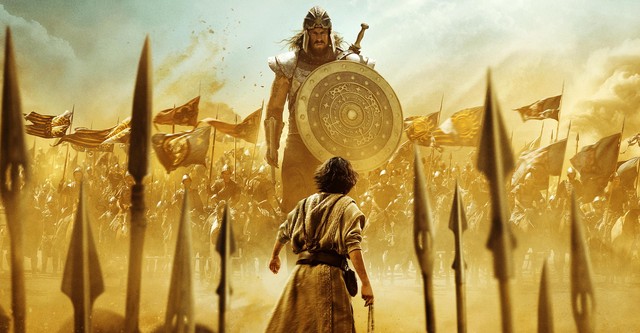I was recently recommended by a close friend to take the time to watch the TV series House of David. Now, you have to understand my upbringing—I immediately shriek with involuntary horror when someone suggests I watch a biblical story produced for entertainment.
Why? Based on past experiences, if it’s a Christian group that produced it, you can almost guarantee poor acting, weak scripting, and low production value. On the other hand, if it’s a Hollywood-style production, there are usually far-fetched liberties taken, major key moments glossed over, and… well, you get the picture.
And yes, I’m still judging most of these films by The Ten Commandments with Charlton Heston in 1956. LOL!
But here’s the twist.
Despite my skepticism, watching House of David—setting aside any creative liberties that my Bible scholar friends might debate—genuinely made me think differently about David, how God moves in our lives, and parts of the story after Goliath that I’ve brushed past too many times. I’m not here to argue theological accuracy or cinematic choices. I’m here to say that this series inspired me to dig deep into the Word again, to read the story of David with fresh eyes and renewed passion.
Here are a few of the powerful takeaways that reshaped my perspective:
David: The Worshipper Who Became a Warrior
David’s story begins in humble obscurity. The youngest of eight sons, a shepherd boy in the fields of Bethlehem. While the world overlooked him, God saw his heart.
In the solitude of the pastures, David developed an intimate relationship with God. He played the harp, wrote psalms, and poured out his soul in worship. His connection to God wasn’t formed in a palace—it was forged in private, quiet moments.
Worship made David different.
In those hidden places, David learned to hear God’s voice, to trust Him, and to draw strength from Him. Worship wasn’t a performance—it was his weapon. So when a lion or bear came after the sheep, David didn’t run. His courage had already been formed in worship. He fought them off, not with bravado, but with confidence rooted in God’s presence.
The Anointing & the Battle
When the prophet Samuel came to anoint a new king, God didn’t choose one of David’s taller, stronger brothers. He told Samuel, “Man looks at the outward appearance, but the Lord looks at the heart.” (1 Samuel 16:7)
David’s heart was already burning with worship.
After the anointing, David didn’t immediately head to the palace—he went back to tending sheep. But soon, his gift of worship opened another door. He was summoned to play the harp for King Saul, whose spirit was tormented. As David worshipped, Saul found peace. Even before David wielded a sword, his worship carried power.
Then came Goliath.
While Israel’s entire army trembled in fear, David stood in awe—not of Goliath, but of God. Why? Because worship had trained him to see the Lord as bigger than any battle.
David said to Saul:
“The Lord who delivered me from the paw of the lion and the paw of the bear will deliver me from the hand of this Philistine.”
(1 Samuel 17:37)
Armed with a sling, five smooth stones, and unwavering confidence in God, David ran toward Goliath—and took him down. Worship had prepared him for war.
Worship Fueled His Battles
David went on to lead armies and rule as king, but it wasn’t strategy or strength that set him apart—it was his heart of worship. He wrote much of the Book of Psalms—raw, honest cries of praise, lament, repentance, and hope.
Even after major failures—like the one with Bathsheba—David returned to a posture of worship. That’s why God still called him “a man after My own heart.” (Acts 13:22)
The Pattern: Worship ➝ Identity ➝ Authority
- Worship gave David identity—he knew who he was in God.
- That identity gave him authority—to slay giants, lead a nation, and walk boldly.
- And through it all, he remained a worshipper—dancing before the Lord with all his might, undignified in the eyes of man, but fully alive in the presence of God.
David’s life shows us that worship isn’t just a song—it’s the foundation for battle. It’s in God’s presence that we gain strength, vision, and courage for the fight ahead.
The Giants After Goliath
Goliath had brothers. It’s a small detail, but one that holds huge significance.
According to 2 Samuel 21:15–22 and 1 Chronicles 20:4–8, Goliath wasn’t the only giant—he had four other giant relatives from Gath. These weren’t just big men; they were warriors, and they posed real threats.
Here’s what hit me:
Revelation #1: David Wasn’t Just Ready for One Giant
The Bible says David picked up five smooth stones before facing Goliath.
Why five? Not because he thought he’d miss the first shot—but because Goliath had four brothers.
David wasn’t prepared to slay a giant—he was ready to wipe out the entire family of giants. He came prepared for all of them, not just the one standing in front of him.
Revelation #2: David Raised Giant Slayers
David trusted the Lord in private to defeat the lion and bear. He trusted Him in public to defeat Goliath. But his faith didn’t stop there.
David’s boldness sparked something in his men.
The same warriors who followed David eventually tracked down and killed the rest of the giants. David’s courage and faith multiplied in those around him. His legacy wasn’t just about what he did—it was about what he inspired others to do.

Final Thoughts
Watching House of David reminded me that when we make space for worship—when we build a life around God’s presence—we are equipped not only for our current battles but for the ones still to come.
And perhaps more importantly, our worship shapes others. Our obedience inspires new warriors. We cannot lead people to places we have not had the faith and courage to go ourselves!

